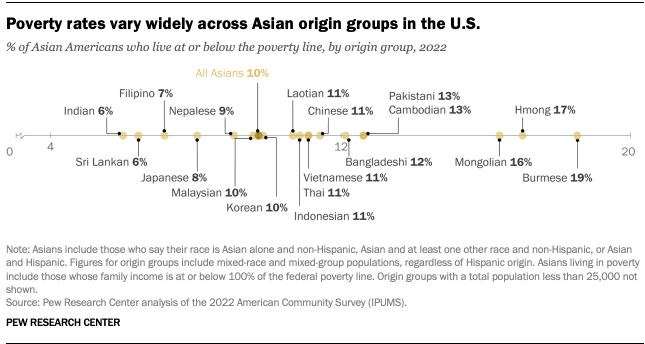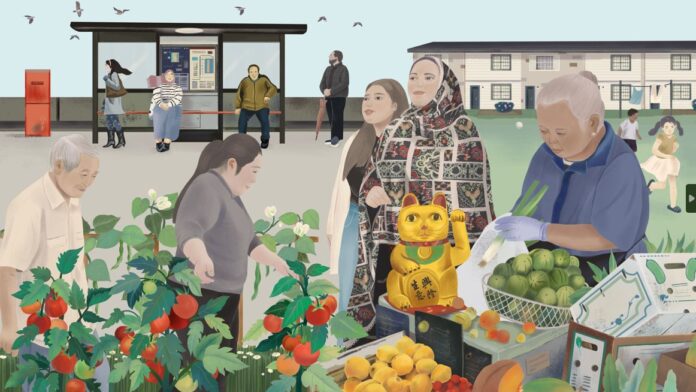By Fan Chen
Last year, Jessica Zheng quit her job at a nail salon in midtown New York after working there for over two decades. She said the job, which requires long sitting and bending while inhaling fumes and toxic chemicals, left her nothing but a diagnosis of thyroid cancer, and bare minimum savings that could only afford the surgery in China, Zheng’s home country.
She now works as a home attendant, earning less than half of what she used to make. She lives in a Queens basement despite decade-long frozen shoulder and knee arthritis. At age 54, she hates that time could not flee faster, as all she counts on is retirement and government health benefits.
The surgery left a finger-long scar on her neck that still aches. It reminds Zheng how her American dream got chipped away while grappling with poverty: food, health insurance, rent, and raising a child.
One in 10 Asian Americans, like Zheng, live in poverty, Pew Research Center found in a latest report. The report explores various experiences of Asians living in poverty through interviews with 144 participants in 12 languages and surveying 7,006 Asian adults.
Poverty rates vary vastly within the origin group
Asian Americans have the most income inequality of any major racial or ethnic group in the U.S., the report said. While often considered economically and educationally successful, Asians who grapple with economic hardships are often unnoticed.
Poverty rates vary vastly across origin groups, Pew Research Center finds. For example, 19% of Burmese Americans have a family income at or below the federal poverty line, in contrast to 6% of Indian Americans.

The report also found that 26% of Asian Americans in poverty live in metropolitans like New York City, Los Angeles, and San Francisco. Fresno, C.A., Buffalo, N.Y., and Pittsburgh, P.A. have the highest poverty rates among Asian Americans.
Language barrier poses extra challenges for immigrant Asians
Nearly 60% of the population who live in poverty are immigrants, the analysis found. Among the Asian immigrants aged 5 and older, fewer than half speak English proficiently.
Language barriers created extra challenges when immigrants navigated life in the U.S. Particularly housing, said Emily Rios, the community service managing director at Asian Americans for Equality (AAFE).
Rios’ department provided housing counseling for over 2,500 people annually, most of whom requested lease review and renewals, translation, and legal assistance. Eviction and rent hikes are the two major issues that immigrant tenants face. About 1 in 3 Asian adults living in poverty said they had problems paying rent or mortgage in the past year, according to Pew Research Center’s report.
“When everything is in English and you don’t understand the language, it’s very easy to not know what you’re signing,” Rios said.
Access to community resources
Lacking English proficiency also makes access to community resources and government benefits more difficult, Rios pointed out.
A majority of Asian adults who live in poverty have turned to family or friends for help and nearly half of them seek help from the government, the survey found. In contrast, only 13% reached out to Asian community organizations. 19% said they have never turned to or received assistance from any resources.
The analysis also revealed that Asians who immigrated to the U.S. due to conflict or war in their origin country mention government assistance programs more often than others.
Pew Research has also produced a short film based on their report.
Jessica Zheng said she had not reached out to community organizations or known any but would seek solidarity in the future.
“I wish there was more support when the pressure of surviving here almost crushed me,” Zheng said. “The power of a single person is just too weak.”
AsAmNews is published by the non-profit, Asian American Media Inc.
We are currently funded by our readers and such charitable foundations as the Robert Wood Johnson Foundation, AARP, Report for America/GroundTruth Project & Koo and Patricia Yuen of the Yuen Foundation.’
Find additional content on Bluesky, Facebook, Instagram , Tiktok, X, and YouTube. Please consider interning, joining our staff, or submitting a story, or making a tax-deductible donation.
You can make your tax-deductible donations here via credit card, debit card, Apple Pay, Google Pay, PayPal and Venmo. Stock donations and donations via DAFs are also welcomed. Contact us at info @ asamnews dot com for more info.


